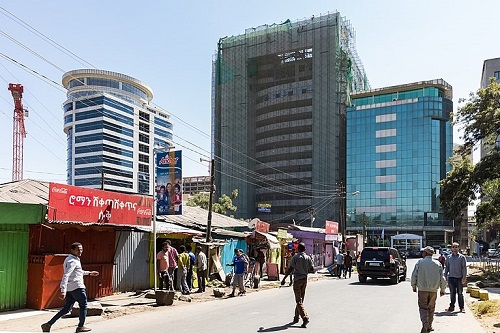CC photo
By
Teklebirhan Gebremichael
Those who doubt that the government before reform was a kleptocracy need only look around themselves and observe the appealing income and wealth inequalities. The widely known Forbes Magazine has recently published the ten richest persons in Ethiopia. All of them are top-level politicians or people with close ties with such public figures.
As a matter of fact, it has been roughly estimated that the total amount of money and property pillaged from the people and the country over the last twenty-seven years is in the vicinity of 1.5 trillion birr, of which some thirty million dollars is believed to have been smuggled out of the country.
Such money and wealth is held in various and multiform. They include cash in private safes and bank balances abroad (of course in hard money). They also include high-rise buildings at home, luxury cash including V8s and Hummers, shares in private and party-officiated business enterprises including EFFORT, TIRE and METEC, and land holdings. All this money and wealth would not have mattered much if it had its physical or real counterpart in the form of commercial forms, agro-industries and other industries which would have helped feed, clothe and house the Ethiopian people.
Unfortunately, that has not been the case. In fact, the nouveau riches have used inflation not only to enrich themselves but also to impoverish the Ethiopian people. As such, they have weaponized inflation to subjugate the people through deliberately engineered poverty in addition to the usual use of force. Inflation has been used by the kleptocratic class to extract resources from the people and the country. The trick is simple. Take vast amounts of credit especially from government-owned banks without collateral or with a fraction of the collateral normally required and spend the money on any goods and services of your choice. Of course, you would have to be a member of the kleptocratic class closely tied to its pervasive patronage system in order to be able to have such a privilege. When this is respected on a large scale it can cause enough pressure on resources to push prices ever higher and therefore price most people out of the market. The higher prices enable the kleptocratic class to extort resources without much competition. What is easily affordable to the kleptocratic class rises further beyond the reach of fixed-income earners such as teachers and other government employees, including soldiers.
As the great American economist Milton Friedman has long postulated, “inflation is always and everywhere a monetary phenomena.” If the growth of the supply of money in an economy is greater than that of the supply of real goods and services, then prices are bound to rise, thus causing inflation. In the Ethiopian economic context, inflation is caused, to various degrees, by all classes of money including bond money, narrow and reserve money or high-powered money (which includes currency in circulation). These classes of money increase through domestic credit and net foreign change earnings.
When the kleptocratic class borrows vast amounts of money from the commercial Bank of Ethiopia and the development Bank of Ethiopia without collateral or with little collateral, and these loans are actually frittered away on luxury consumption goods and services instead of on productive investment assets, then the outcome cannot be anything but inflation. The same theory applies to the government borrowing from the national Bank of Ethiopia and to borrowing by government development agencies from the commercial Bank of Ethiopia and the Development Bank of Ethiopia. More than a third of such borrowing are estimated to be gobbled up by corruption and wastage.
Hence, in the Ethiopian economic context, bank credit extended to the kleptocratic class enables it to extract resources by inflation, while corruption constitutes a more direct method of exploitation and embezzlement. They both exacerbate the already worsening living conditions of the vast majority of the Ethiopian people who, unfortunately, still seem destined to continue to wallow in abject poverty.
It is useful to mention here that the axis of poverty (or the triangle of poverty) is completed by a factor deeply embedded in human nature, namely procreation. I personally think that a Malthusian apocalypse is gradually unfolding in Ethiopia without being noticed to any significant extent. Nothing is more disheartening than to see throngs of humanity simply loafing around on the streets of Addis Ababa unproductive (in terms of production of goods and services and not in terms of fecundity). Population growth spawns youth unemployment which in Ethiopia is fast approaching the sixty percent mark! Population growth in a country where the powers that be are determined to keep their own subjects benighted lest enlightenment should open their eyes to the kleptocracy that is so crudely oppressing the limitless potential slumbering within them.
Hence, the axis of poverty, namely the trio of kleptocracy (whose hallmark is corruption) inflation and unproductive population growth weighs down heavily on the Ethiopian people keeping them deeply mired in poverty and in immeasurable misery. As may be readily observed, the main operating system here, so to speak, is the kleptocracy which appends quality education and training to keep the population in the dark; wantonly prints money to extract resources by inflation; maintains a tight monopoly on land to keep its prices sky-high for its own benefit; funds a military, police and security organizations to keep the population permanently cowed and defeated.
All this would conjure up a Marxian scenario of two classes, one of exploiters and the other of the exploited, locked in a mortal class struggle. There seems to be no other way to view the situation. It is a social ticking bomb waiting to explode any time. The vast majority of the Ethiopian people, including those living in rural areas, cannot afford even a single balanced meal a day in a country where 72 million hectares of the land are arable (but only about 15 percent is cultivated) and livestock resources are believed to be among the largest in the world. Housing, water and electricity supply and transport problems in Addis Ababa, the capital not only of Ethiopia but also of Africa, are horrendous.
Hence, a Marxist specter is haunting Ethiopia, not that socialism is in any way better than capitalism. By the same way, I do not know of any other person who has lavished more praise on capitalism than the great Karl Marx (no serious thinker can afford not to admire the great German) himself. In actual fact, fair and competitive capitalism is not exploitative at all. Profit, as Marx would postulate, is not surplus value not paid to the workers, but rather a result of underlying scarcity under competitive capitalism. A valid point instead would be that workers should have a share in this profit. From this viewpoint, socialism is a non-starter. It kills the prime mover, free individual enterprise, which initiates the very economic activity or business enterprises to make profit.
But the Ethiopian Situation is entirely different. It is neither capitalism nor socialism. It is simply a glaring example of kleptocracy or state capital. A predatory state and its networked structures control all factors of production, including loan and capital, and have deliberately weaponized inflation to extract resources from the people and the country. Hence, two classes of people have emerged from this exploitative patronage system: the people who are the oppressed and the exploited on the one hand and the oppressors and the exploiters on the other hand. As may be easily guessed, this is a sure-fire recipe for a Marxian denouement; the expropriators must be expropriated!
Do not be duped by the cover-up, ethnic politics, which, at best, can only serve as a thinly vied mask for the time-honored and relentless underlying class struggle!



No Comments Yet!
You can be first to comment this post!